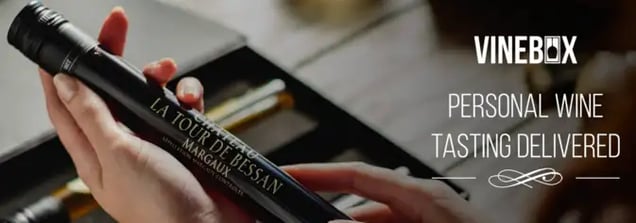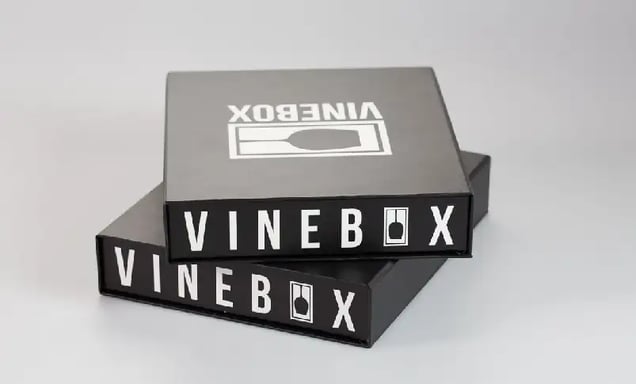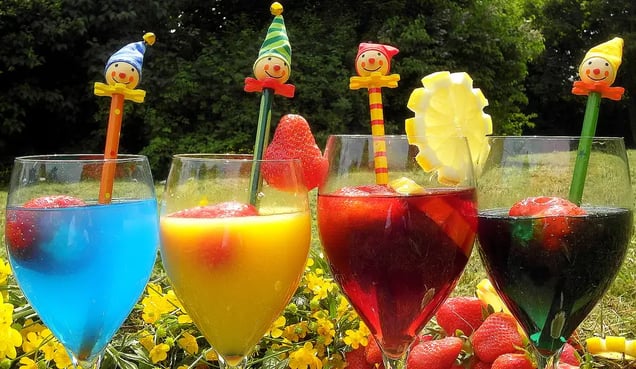Matt Dukes likes to drink wine every day. “It’s a skill I got as an attorney,” he said. Dukes is co-founder of VINEBOX, a wine-by-the-glass subscription service that starts shipping in January 2016.

But Dukes didn’t start VINEBOX to drink for free. VINEBOX’s business model is part of a trend that’s been sweeping the booze industry; single serving subscription startups.
Alcohol subscription startups offer consumers a small taste of a luxury brand, introducing them to something new and enticing. And it gets the merchants’ products in front of millions of potential customers.
The business model is basically the Birchbox model for booze. It’s paying off big time.
Consider this: Subscription beauty box Birchbox, founded in 2010, is now valued at $485 million. Zuora is valued at $115 million. Clearly a desirable market to enter.
That’s why it’s no shock that there are currently over 400 subscription box services available; monthly packages offering everything from shoes, sex toys, and cannabis, to snacks and alcohol. In May 2015, Zuora, a SaaS for subscription companies, held their fourth subscription box conference, Subscribed, in San Francisco. They had 2500 attendees.
There are around 30 alcohol subscription boxes currently available, according to My Subscription Addiction.
Combining the demand for subscription services with the popularity of alcohol startups seems like an all round win. A dream business?
Just look at the numbers.
American spirits made $23.1 billion in revenue in 2014. And the American wine industry made $37.6 billion in 2014.
The wine business is ripe for reinvention.

This is where Matt Dukes comes in
Two years ago Dukes was miserable. The 29-year-old worked long hours in corporate law at his New York firm. It was dark when he left his apartment, dark when he returned. One day he flipped.
He sold all his possessions on Craigslist, subleased his apartment, and quit his job. He bought a one way ticket to France. He doesn’t speak French.
This type of story rarely ends well. But it was the kick up the butt Dukes needed.
He joined a volunteer program on a vineyard. He harvested grapes, carried buckets, and helped bottle 6,000 bottles of wine. The tension of the last five years faded away.
And he stumbled across something that would change his life: a small test tube-like vial filled with wine.

Each tube contained enough liquid for one glass. Dukes was amazed, he’d never seen anything like it. He wanted to buy it for his friends. But he couldn’t, as they weren’t stocked or sold anywhere. He discovered that they were manufactured by a tiny local business, which used them for demos in b2b wine sales.
Dukes’ brain started ticking. What if he could offer this to people looking for new wine experiences, a different vintage per vial? He knew the subscription box model was exploding — in 2012, France-based JolieBox was acquired by Birchbox, and Club W, a monthly wine bottle subscription service, raised $10 million by January 2014.
Dukes knew there was an opportunity to make waves in the booze market.
But he couldn’t do it alone. So he contacted Rachel Vodofsky, a former law school classmate. Would she be interested in teaming up?

Vodofksy was wary to begin with. “My attorney friends though he was crazy, you don’t quit if you don’t know what you’re doing next!” she said. But she felt stifled at work, and liked the idea of being her own boss. She knew her legal experience would be useful in the heavily-regulated industry. She was in!
In January 2015, the duo moved to San Francisco to focus on VINEBOX full-time.
“San Francisco straddles wine country and Silicon Valley,” Dukes explained. “It seemed like good synergy.”

Despite Californian wine sales raking in 65% percent of American wine revenue ($24.6 billion out of $37.6 billion) the majority of wine startups are out of state. Out of the six most funded, one is in New York, one in Massachusetts, and one in England. The rest are in China. The most funded is China-based Jiuxian, which raised $69 million for its wine import business, according to TechCrunch’s data.
As of November 6, 2015, 607 wine and spirits startups are displayed on AngelList. Six were added this month.
“Consumption of beer, wine, and spirits is higher at home than away from home,” Julia Gallo-Torres, Senior Analyst at Mintel said. “Consumers are still price-conscious and will likely seek out promotions.”
The average valuation of these alcohol companies is $4.4 million. And alcohol startups collectively raised $100 million in 2014.
Dukes’ San Francisco-based business is an anomaly, as is the fact that he and Vodofsky bootstrapped their company.

So what exactly is a VINEBOX? The core offering is a sleek black box, with three high-end wine vials resting inside.
“It’s what a high-class vampire would order, at least, the red options.”Zara Stone
$35 a month lets users experience “a themed story of different regions.” That’s a nice take, and the vials are larger than expected in person… and sturdy. I dropped one when I picked it up (Dukes managed not to wince), and it withstood the four foot drop to a concrete floor.
VINEBOX’s goal is to get great wine in front of wine drinkers. It’s about the solo time; one glass a vial isn’t super shareable. But the single-serve economy is exploding as more millennials live and eat alone, reports food industry trend company, The Hartman Group.
And with 47% of all eating occasions being solo experiences, VINEBOX is tapping into a demand for single experiences.
But dealing with alcohol falls under complex food and beverage laws, which complicates things for newbie entrepreneurs. Luckily, the ex-lawyers know a thing or two about navigating clauses, but they told me how shocked they’ve been.
Not to bore you guys here, but some laws were so antiquated that it’s fun to share. For me, the entrepreneurs had to deal with this shit for real.
For one, wine can only be distributed in certain fill sizes. Dukes had to select between a 100ml (3.4oz) vial or a 187ml (6.3oz) vial; those are the smallest legally allowed sizes. And Pennsylvania has a clause where you can’t ship a bottle from outside the state if it would compete with something sold in state. Basically, everything.
And the problems didn’t end there.
Wine might be delicious, but it’s temperamental, oxidizing as soon as you open the bottle. By delivering re-bottled wine, Dukes and Vodosofky had to use a special machine. There are only two in the world that are quality-approved for this; both are in France. For now, all the wine they send out has to be bottled in France, then shipped to America. That’s a big expense. Long-term they want to build their own machine, but that’s more of a ‘watch this space’ idea.
But with such a high demand for the product, they aren’t letting these details worry them.
They aren’t the only companies competing in this space. A lot of alcohol startups are vying for the billions of dollars on offer.
25-year-old Nick Rellas knows how to work this market. He co-founded alcohol delivery service Drizly three years ago. It’s now valued at $40 million.
For Rellas, alcohol startups are all about getting the technology right. “The world moved from physical to digital,” he said. “This permeated through every area of our life apart from buying alcohol.”
19 lawyers later, he’s managed to make his delivery service work. Drizly’s app can send wine, beer, and spirits to most states at the touch of a button.
Rellas sees a lot of opportunity in making the alcohol buying process more of an experience. He explains this by referencing the statistic that one in a hundred dollars are spent on alcohol. 70% of that, he said, are for “off premise” drinking. That’s your living room, folks.
But he’s not sold on the wine shipping business. “80% of alcohol is bought and consumed the same day,” Rellas told me. “People saying you want this, wait two weeks – that’s a small part of the market.”

Rellas is right, but there’s still big profit in subscription services.
$35 billion and up, according to Xander Oxman, CEO of Club W, a wine bottle subscription service. That’s actually lower than the number we’re using here ($37.6 billion). Oxman told me that he believes direct-to-consumer selling is a compelling model. “Not only from a business standpoint (fewer middlemen = better value for consumers), but also because it allows us, as the producer, to talk directly with our customers – thereby providing them with a richer wine experience,” he explained.
But the competition is growing.
There’s Saloon Box, launched in 2015, a Kickstarter-funded company that sends cocktail ingredients to you monthly for $37.50. Cocktail Courier, launched late 2014, delivers a box containing enough for four to eight cocktails for $39.99 a month. They also have two-day delivery options.
In wine, the big names are Club W, three bottles for $39 a month; and Wine Awesomeness, $35 a month for three bottles. For now, VINEBOX is unique: its single-serving format is a big differentiator. They’re banking on that appeal, especially with gifting season looming.
“How you drink, where, and why is often as important as what,” Rellas said, explaining millennials are focused on the drinking experience and craft, as well as the end result.
Oxman agrees, and said that’s a big part of Club W’s model. “We strive to tell those stories in the most compelling ways for each of our wines – without being pedantic or pompous,” he said.
Something the wine industry hasn’t been historically good at.
The first VINEBOX is scheduled to ship this January, and newcomers have to sign up to the waitlist. Dukes and Vodofsky are busy trying to fill the initial demand.
The bigger question is: Will Dukes use wine from the vineyard he had his epiphany (or breakdown) in? He hopes to in the future, but for now that vineyard has sold out.
Watch this space.
Header image credit: Flickr/Andrew_mc_d

